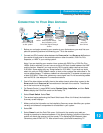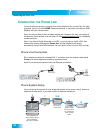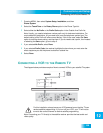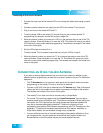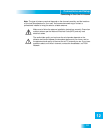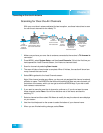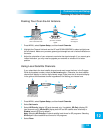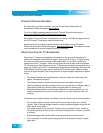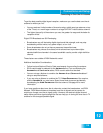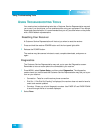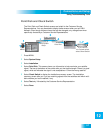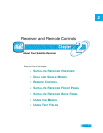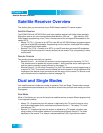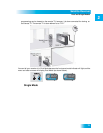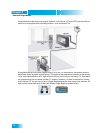
Connections and Setup
115
Connecting an Over-the-Air Antenna
To get the best possible digital signal reception, make sure you use the best over-the-air
antenna for where you live:
• You can receive a limited number of channels using a rabbit ears type antenna on top
of the TV set, or a much larger number via a large UHF/VHF indoor/outdoor antenna.
• The higher the quality of the antenna you use, the greater its range and the better its
reception will be.
Digital OTA Broadcasts are Still Developing
• Broadcasters may still be testing digital signals and their strength, and may stop
broadcasting without notice, vary power output, or turn it off.
• Some broadcasters do not yet have a permanent transmitter tower.
• Broadcasters may choose to multicast, which allows them to provide multiple
standard-definition channels in the same bandwidth used to provide a high-definition
channel.
These factors are outside of DISH Network's control.
Additional Installation Considerations
• Follow local and National Electric Code requirements for grounding the antenna.
• RG-6 coaxial cable is preferred for the A
NTENNA IN line. If you are diplexing the
A
NTENNA IN and SATELLITE IN cables, RG-6 coaxial cable must be used.
• You can not use a diplexer to combine the A
NTENNA IN and SATELLITE IN cables if
using an amplified antenna.
• If you are using a diplexer to combine the TV 2 H
OME DISTRIBUTION of the receiver,
and the A
NTENNA IN, you must use a Super Home Node to prevent accidentally
broadcasting the H
OME DISTRIBUTION from the antenna. See page 49 for more
information.
If you have questions about over-the-air channels, contact the broadcasters, not DISH
Network. DISH Network does not broadcast over-the-air signals and so cannot do
anything to change over-the-air signal quality. However, the receiver's digital channel
setup menus provide a signal strength bar that can help you in aiming the over-the-air TV
antenna for the strongest possible signal.



